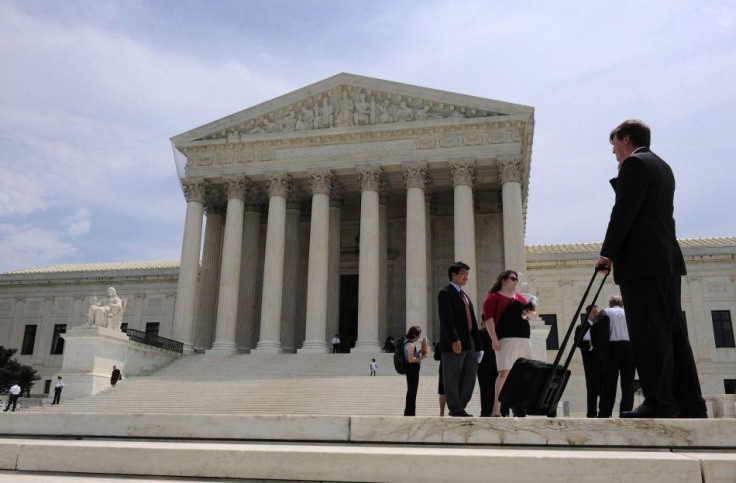As The Supreme Court Returns, More Historic Decisions?

Only a few months after the landmark ruling that preserved President Obama's health care law, the Supreme Court will reconvene on Monday for a session that is likely to include another set of momentous cases.
The court's 5-4 decision upholding the constitutionality of the Affordable Care Act's individual mandate, coupled with a ruling on Arizona's contentious new immigration law, made the previous term one of the more significant ones in memory. The upcoming term could continue that trend.
The high court could weigh in on topics that range from the fate of race-based college admission policies to the legacy of the Voting Rights Act to the future of same-sex marriage. At a time when Congress is bitterly deadlocked, the potentially sweeping repercussions of the Supreme Court's docket this term underscore the high court's role in shaping the political landscape.
- Leading off is a case that considers whether American courts can be a venue to litigate human rights violations abuses that occur outside of American soil. A group of Nigerians who have received political asylum in the United States are suing Shell Oil for allegedly working with the Nigerian government to crush dissent against oil production. The plaintiffs are invoking a 1789 law, the Alien Tort Statute, that allows U.S. courts to hear civil cases that concern "a violation of the law of nations or a treaty of the United States."
- Affirmative action will take the spotlight on October 10, when the court is scheduled to hear arguments in Fisher v. University of Texas. The case pivots on the University of Texas' use of race in the admissions process: The university factors in race for applicants that did not graduate in the top 10 percent of their high school classes and the plaintiffs, both white women who were not admitted, are charging that system is discriminatory.
The Supreme Court backed a college admissions process that incorporates race just under a decade ago, siding in Grutter v. Bollinger with the University of Michigan Law School's decision to consider race.
- Same-sex marriage is likely to surface, although the justices have not yet said they will take up one of the same-sex marriage cases traveling through the lower courts. At issue is the federal Defense of Marriage Act, a law that prevents the federal government from recognizing same-sex marriages as legitimate. Because of DOMA, same-sex couples who marry in states permitting such unions are still barred from receiving federal benefits like shared health care and the right of an American citizen to sponsor an immigrant spouse for permanent residency.
Some of the DOMA challenges are more ambitious than others, potentially affecting the scope of a Supreme Court ruling. Perhaps the most high-profile possibility is the challenge to California's Proposition 8, which prohibits the state from honoring same-sex marriages. The lawyers arguing against Proposition 8 are trying to establish a constitutionally protected right to same-sex marriage.
- The Voting Rights Act has been the source of significant partisan strife during this election cycle. The Department of Justice has invoked the Civil Rights-era law to review new voting restrictions for evidence of discriminatory intent. A section in the Voting Rights Act requires federal clearance of new voting measures in counties that had a history of discrimination.
Critics say that mechanism is an outdated relic of the Jim Crow era, something that no longer serves the same purpose decades after it was passed. As with same-sex marriage, the Supreme Court has not yet announced whether it will take up one of several challenges to the Voting Rights Act.
- The court is also taking up a case that considers the limits of overseas surveillance permitted under the Foreign Intelligence Surveillance Act. That law empowers the government to monitor the phone calls and emails of terror suspects living abroad.
A group of journalists, attorneys and human rights workers sued, contending that because their work sometimes compels them to communicate with potential terror suspects, the government could then track their conversations. The Obama administration said the plaintiffs had no standing to sue, but in 2011 a lower court disagreed.
© Copyright IBTimes 2025. All rights reserved.





















